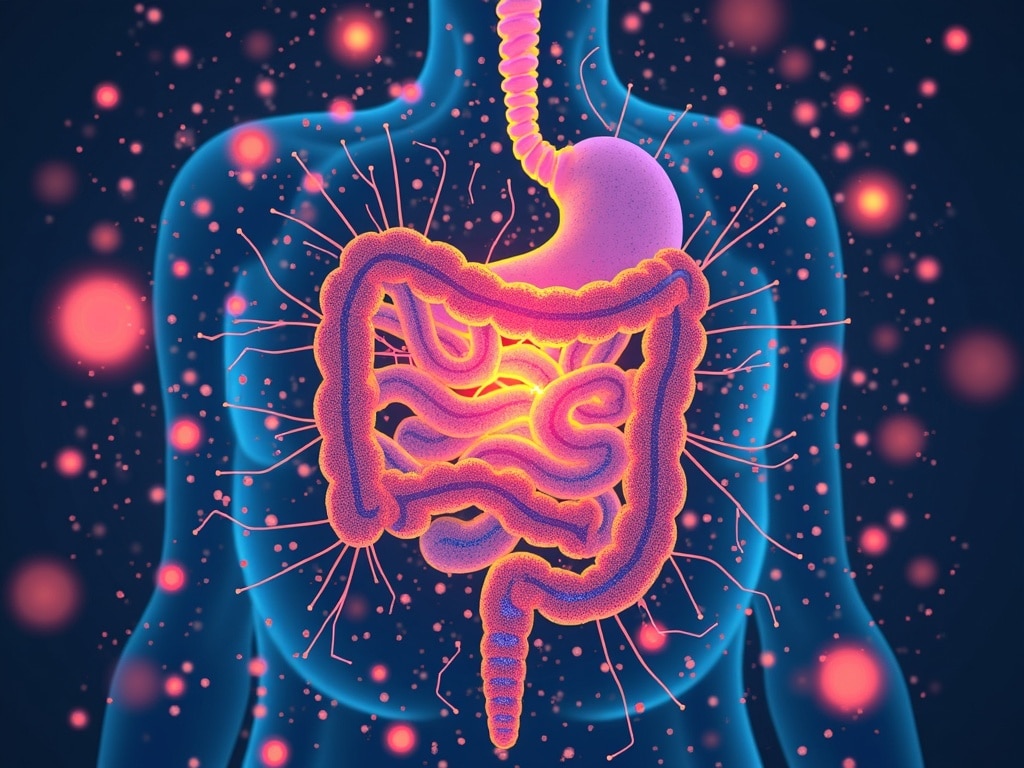The Unseen Symphony: How Gut Health Orchestrates Your Hormones
Imagine your body as a finely tuned orchestra. Each instrument, representing a different organ system, plays its part in creating a harmonious melody of health. But what if the conductor – the gut – is out of sync? The resulting dissonance can manifest in surprising ways, particularly affecting the delicate hormonal balance that governs everything from your mood and metabolism to your reproductive health and sleep.
The connection between gut health and hormones is a powerful and often overlooked aspect of overall well-being. It's a bi-directional relationship, meaning your gut influences your hormones, and your hormones, in turn, affect your gut. Ignoring this intricate interplay can lead to a cascade of hormonal imbalances and related health issues. Let's delve into this fascinating connection and explore how nurturing your gut can pave the way for hormonal harmony.
The Gut Microbiome: A Hormonal Command Center
The gut microbiome, the vast community of bacteria, fungi, viruses, and other microorganisms residing in your digestive tract, is far more than just a digestive aid. It's an active endocrine organ, meaning it can synthesize, metabolize, and regulate hormones. These microbes play a pivotal role in maintaining hormonal equilibrium through several mechanisms:
- Estrogen Regulation: The gut houses an enzyme called beta-glucuronidase, which deconjugates estrogen, allowing it to be reabsorbed back into the bloodstream. An imbalanced gut microbiome, characterized by dysbiosis, can lead to an overproduction of beta-glucuronidase, resulting in excessive estrogen reabsorption. This can contribute to estrogen dominance, a condition linked to various issues like PMS, fibroids, and even certain cancers. Conversely, a lack of beneficial bacteria can reduce estrogen recycling, potentially leading to estrogen deficiency.
- Thyroid Hormone Conversion: While most thyroid hormone conversion occurs in the liver, the gut also contributes to this process. Certain gut bacteria aid in converting inactive T4 thyroid hormone into active T3, essential for metabolism and energy production. Gut dysbiosis can impair this conversion, potentially contributing to hypothyroidism symptoms, even with adequate thyroid hormone replacement.
- Neurotransmitter Production: A significant portion of neurotransmitters, chemical messengers that profoundly impact mood, sleep, and cognitive function, are produced in the gut. Serotonin, often dubbed the happy hormone, is primarily synthesized in the gut. Dopamine, GABA, and other crucial neurotransmitters are also influenced by the gut microbiome. An unhealthy gut can compromise neurotransmitter production, potentially contributing to anxiety, depression, and sleep disturbances.
- Inflammation Control: The gut is instrumental in regulating inflammation throughout the body. A leaky gut, or increased intestinal permeability, allows bacteria and toxins to enter the bloodstream, triggering an inflammatory response. Chronic inflammation is a major disruptor of hormonal balance, interfering with hormone receptor sensitivity and overall endocrine function.
- Blood Sugar Balance and Insulin Sensitivity: The gut microbiome influences how your body processes glucose. Certain bacteria promote insulin sensitivity, while others contribute to insulin resistance. Imbalances in the gut microbiome can exacerbate blood sugar fluctuations and increase the risk of type 2 diabetes, further impacting hormone levels.
Hormones' Impact on the Gut
The relationship between gut health and hormones isn’t a one-way street. Your hormones also wield significant influence over your gut environment:
- Cortisol (Stress Hormone): Chronic stress and elevated cortisol levels can negatively impact gut health. Cortisol can reduce beneficial bacteria, increase intestinal permeability (leaky gut), and impair digestive function.
- Estrogen: Estrogen influences gut motility and the composition of the gut microbiome. Fluctuations in estrogen levels, such as during menstruation or menopause, can affect gut function, potentially leading to bloating, constipation, or other digestive discomforts.
- Thyroid Hormones: Thyroid hormones regulate metabolism, which directly affects gut motility and digestive processes. Hypothyroidism can slow down gut motility, leading to constipation, while hyperthyroidism can accelerate it, causing diarrhea.

Signs Your Gut is Disrupting Your Hormones
Recognizing the signs of a gut-hormone imbalance is the first step toward addressing the issue. Look out for these common symptoms:
- Digestive Issues: Bloating, gas, constipation, diarrhea, irritable bowel syndrome (IBS)
- Mood Swings and Mental Health Problems: Anxiety, depression, brain fog, difficulty concentrating
- Sleep Disturbances: Insomnia, poor sleep quality
- Skin Problems: Acne, eczema, rosacea
- Weight Fluctuations: Unexplained weight gain or loss, difficulty losing weight
- Menstrual Irregularities: PMS, irregular periods, heavy bleeding
- Fatigue: Persistent tiredness, even after adequate sleep
- Autoimmune Conditions: Hashimoto's thyroiditis, rheumatoid arthritis, lupus (often linked to leaky gut)
Reclaiming Hormonal Harmony: A Gut-Focused Approach
Fortunately, you can take proactive steps to improve your gut health and, in turn, support your hormonal balance. Here's a roadmap to get you started:
1. Nourish Your Gut with a Diverse Diet
The cornerstone of gut health is a diet rich in whole, unprocessed foods. Focus on variety and include these gut-friendly options:
- Fiber-Rich Foods: Fruits, vegetables, legumes, whole grains (oats, quinoa, brown rice) provide fuel for beneficial bacteria.
- Fermented Foods: Yogurt (with live and active cultures), kefir, sauerkraut, kimchi, and kombucha introduce probiotics (beneficial bacteria) to your gut.
- Prebiotic Foods: Onions, garlic, asparagus, bananas, and apples contain prebiotics, which nourish existing beneficial bacteria.
- Healthy Fats: Omega-3 fatty acids found in fatty fish, flaxseeds, and walnuts help reduce inflammation in the gut.
Foods to Limit or Avoid:
- Processed Foods: High in sugar, unhealthy fats, and additives, these can disrupt the gut microbiome.
- Refined Sugars: Feed harmful bacteria and contribute to inflammation.
- Artificial Sweeteners: Can negatively impact gut bacteria.
- Excessive Alcohol: Can damage the gut lining and disrupt the microbiome.
- Gluten (for sensitive individuals): Can trigger inflammation and digestive issues in people with gluten sensitivity or celiac disease.
2. Embrace Stress Management Techniques
Chronic stress wreaks havoc on your gut and hormone levels. Incorporate stress-reducing practices into your daily routine:
- Mindfulness Meditation: Calms the nervous system and reduces cortisol levels.
- Yoga or Tai Chi: Promotes relaxation and improves gut motility.
- Spending Time in Nature: Reduces stress and improves mood.
- Adequate Sleep: Aim for 7-8 hours of quality sleep per night to support gut health and hormone regulation.
3. Consider Probiotic and Prebiotic Supplements
While a diverse diet is the foundation, probiotic and prebiotic supplements can provide extra support, especially during times of stress or after antibiotic use. Choose a high-quality probiotic supplement with a variety of strains and consult with a healthcare professional to determine the best option for your individual needs.
4. Address Underlying Gut Issues
If you suspect you have underlying gut issues, such as leaky gut, SIBO (small intestinal bacterial overgrowth), or Candida overgrowth, it's crucial to work with a healthcare professional, such as a functional medicine doctor or a registered dietitian, to develop a personalized treatment plan. Testing may be necessary to identify specific imbalances and guide treatment strategies.
5. Support Liver Detoxification
The liver plays a vital role in hormone detoxification and overall gut health. Support your liver by:
- Staying Hydrated: Drink plenty of water to flush out toxins.
- Eating Liver-Supportive Foods: Include foods like cruciferous vegetables (broccoli, cauliflower, Brussels sprouts), garlic, and turmeric in your diet.
- Avoiding Toxins: Minimize exposure to environmental toxins, such as pesticides and heavy metals.
The Gut-Hormone Connection: A Lifelong Partnership
Understanding the profound connection between gut health and hormones empowers you to take control of your well-being. By prioritizing gut health through diet, stress management, and targeted supplementation, you can cultivate a thriving microbiome that supports hormonal balance, leading to improved mood, energy levels, reproductive health, and overall vitality. It’s not a quick fix, but a lifelong journey towards a healthier, more harmonious you.

